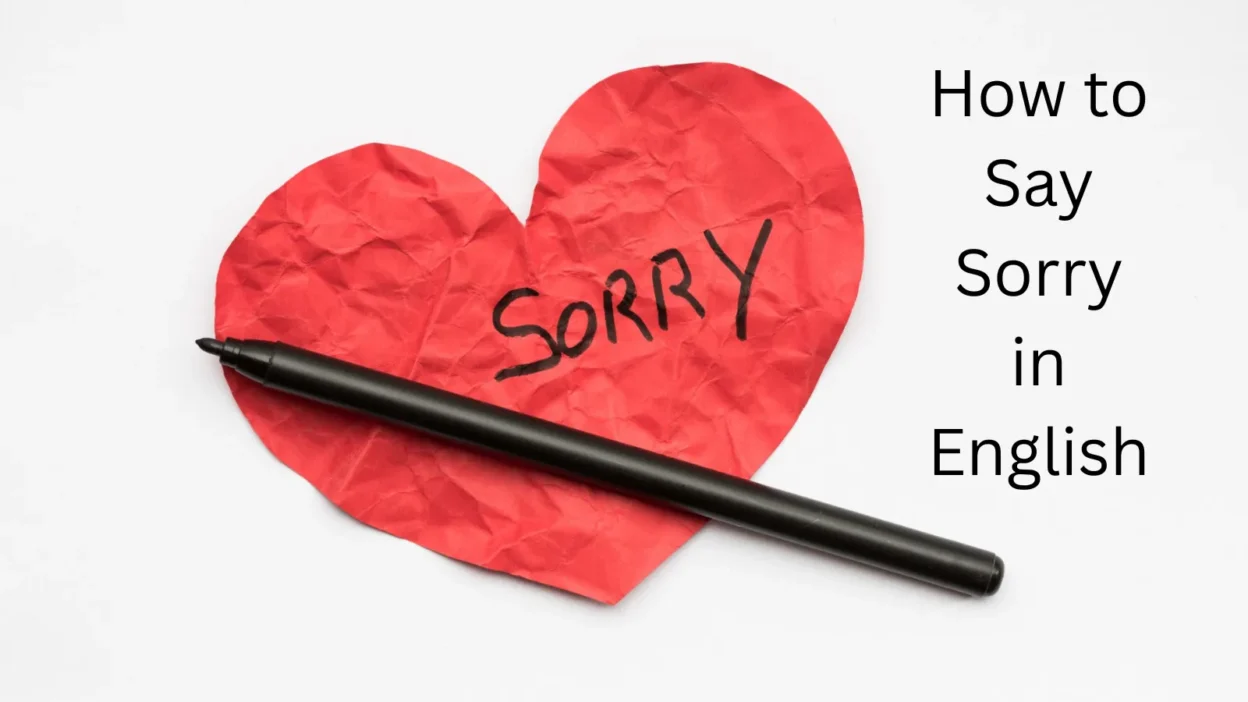How to Say Sorry in English is something everyone should know, If you’re a native speaker or learning English as a second language. Apologizing politely and clearly is a key part of good communication. From casual situations to formal settings, understanding how to say sorry in English helps you express regret, take responsibility, and show respect.
This guide will walk you through the most common and effective ways to apologize in English.
Knowing how to say sorry in English can improve your personal and professional relationships. It also helps avoid misunderstandings and shows emotional intelligence.
Say Sorry in English:
Here are 15 authentic and culturally grounded ways to say sorry in English, complete with dialogue examples and the story behind each phrase
15 Ways to Say Sorry in English (Short Table)
| No. | Phrase | Use / Meaning |
|---|---|---|
| 1 | Sorry | Basic apology |
| 2 | I’m sorry | Polite apology |
| 3 | I’m very sorry | Strong apology |
| 4 | My apologies | Formal apology |
| 5 | I apologize | Very formal apology |
| 6 | Excuse me | To get attention or minor interruption |
| 7 | Pardon me | Polite for small mistakes or interruptions |
| 8 | I didn’t mean to | Explaining unintentional mistake |
| 9 | Oops, sorry! | Casual, friendly apology |
| 10 | My bad | Informal, casual apology |
| 11 | I’m terribly sorry | Strong regret or sympathy |
| 12 | Forgive me | Polite or emotional apology |
| 13 | I sincerely apologize | Formal, heartfelt apology |
| 14 | Please accept my apology | Formal apology in writing |
| 15 | Don’t worry / It’s okay | Response to apology or reassurance |
1. I’m sorry
Origin:
The most standard apology in English. “Sorry” comes from Old English sār, meaning “pain” or “grief.” It’s used across all English-speaking cultures.
Example:
👤 User A: I forgot to call you last night.
👤 User B: It’s okay. I’m just glad you’re safe.
👤 User A: I’m really sorry about that.
Use: Universal and formal or casual, depending on tone.
2. My apologies

Origin:
This formal phrase is often used in professional settings. It’s derived from the noun form of “apology,” which dates back to the 1500s.
Example:
👤 User A: You missed the team meeting.
👤 User B: My apologies. I was stuck in traffic.
Use: Professional and respectful; common in emails or meetings.
3. I’m really sorry
Origin:
Adds emphasis to the basic “I’m sorry,” showing deeper emotion or concern.
Example:
👤 User A: You broke my favorite mug.
👤 User B: I’m really sorry. I’ll replace it, I promise.
Use: Emotional and sincere; used in personal situations.
4. Sorry about that
Origin:
A casual and conversational phrase often used for minor inconveniences.
Example:
👤 User A: You spilled some coffee on my book.
👤 User B: Oh no! Sorry about that.
Use: Casual and light; for everyday slip-ups.
5. I didn’t mean to

Origin:
Shows that the action was unintentional. Often paired with “I’m sorry.”
Example:
👤 User A: You hurt my feelings with that comment.
👤 User B: I’m really sorry. I didn’t mean to upset you.
Use: Emotional and explanatory.
6. Pardon me
Origin:
Comes from French pardonner (to forgive). In English, it became a polite way to seek forgiveness, especially for minor offenses.
Example:
👤 User A: You stepped on my foot!
👤 User B: Oh! Pardon me!
Use: Formal or polite; often used in public settings.
7. Excuse me
Origin:
Used since the 14th century, it comes from Latin excusare, meaning “to free from blame.”
Example:
👤 User A: You just cut in line.
👤 User B: Oh! Excuse me—I didn’t realize.
Use: Polite and situational; often used in crowded places.
8. I owe you an apology
Origin:
A more thoughtful, delayed apology that acknowledges wrongdoing.
Example:
👤 User A: You never admitted you were wrong.
👤 User B: You’re right. I owe you an apology.
Use: Reflective and serious; shows maturity.
9. I’m terribly sorry
Origin:
The word “terribly” intensifies the apology, often used in British English.
Example:
👤 User A: You missed my graduation.
👤 User B: I’m terribly sorry. I had a family emergency.
Use: Formal and deeply apologetic.
10. That was my fault

Origin:
A direct way to take responsibility. “Fault” traces back to Latin fallere, meaning “to deceive or be mistaken.”
Example:
👤 User A: The project failed because of a mistake in the report.
👤 User B: That was my fault. I’ll fix it.
Use: Honest and accountable; good for professional use.
11. I take full responsibility
Origin:
Often used in corporate or public apologies, this phrase conveys accountability.
Example:
👤 User A: The team is disappointed.
👤 User B: I take full responsibility for what happened.
Use: Formal and respectful; used in leadership roles.
12. I regret that
Origin:
“Regret” stems from Old French regreter, meaning “to bewail the dead.” It implies sorrow for consequences, not just the act itself.
Example:
👤 User A: We lost a client because of your actions.
👤 User B: I regret that deeply. I should’ve handled it better.
Use: Formal and reflective.
13. I was wrong
Origin:
One of the most vulnerable and honest ways to say sorry. “Wrong” comes from Old English wrang, meaning injustice.
Example:
👤 User A: You didn’t believe me.
👤 User B: I know. I was wrong, and I’m sorry.
Use: Personal and courageous.
14. My bad
Origin:
Slang expression that emerged from American sports culture, especially basketball in the 1980s.
Example:
👤 User A: You passed me the wrong file.
👤 User B: Oops! My bad—I’ll send the correct one now.
Use: Casual and light-hearted.
15. Please forgive me
Origin:
A heartfelt plea that dates back to biblical language and is often used in serious or emotional moments.
Example:
👤 User A: You lied to me.
👤 User B: I know. Please forgive me.
Use: Deeply emotional; often used in personal relationships.
FAQs
- What is the basic way to say sorry in English?
The most common word is “Sorry.” - Is “Sorry” formal or informal?
It’s neutral — can be used with friends, family, or strangers. - How do you say “I’m very sorry” in English?
Say “I’m very sorry” to show stronger apology. - How do you apologize politely in English?
You can say “I apologize” for formal situations. - How do you say sorry casually to a friend?
Say “My bad” or “Oops, sorry!” - How do you say sorry for a mistake at work?
Say “I’m sorry for the mistake” or “I apologize for the error.” - Can I say sorry in text messages?
Yes, “Sorry” works perfectly in texts or chats. - How do you respond when someone says sorry?
You can say “It’s okay”, “No problem”, or “Don’t worry.” - Is there a strong way to show regret?
You can say “I’m terribly sorry” or “I sincerely apologize.” - Can “Sorry” be used for accidents or small mistakes?
Yes, it’s very common for minor accidents, interruptions, or minor mistakes.
Conclusion:
Now that you understand how to say sorry in English, you can express your apologies clearly and sincerely in any situation. Whether it’s a quick “I’m sorry” or a more thoughtful explanation, using the right words can help you rebuild trust and maintain healthy relationships.
Apologizing the right way shows maturity and emotional awareness.
So keep learning how to say sorry in English to handle real-life situations with confidence and care.

Sophia Mitchell is a passionate content writer known for creating clear, engaging, and informative articles.
She focuses on delivering well-structured content that is easy for readers to understand and trust.
Sophia Mitchell currently contributes quality writing to repliesnest.com, helping readers find accurate answers quickly.



